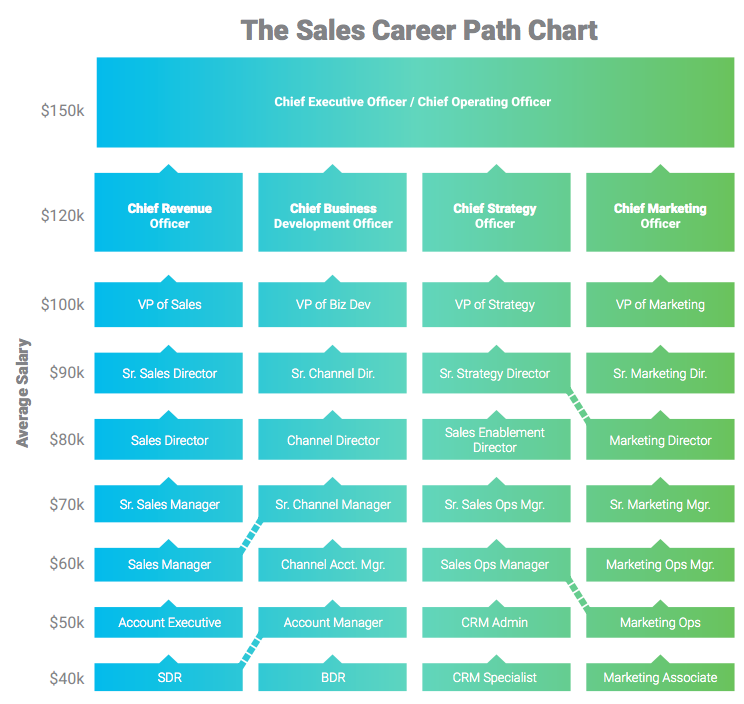Should I Quit My Sales Job?
Is It Time To Move On?
Should I quit my sales job? This is a question all sales professionals ask themselves at some point in their careers.
This is a guide on when it’s time to leave your current sales job and look for a new one. This guide is written specifically for SaaS and other technology sales reps who work at venture-funded companies, but it can be applied to different verticals.
Working in B2B sales is hard. If you’re at a small company where generating new revenue means keeping the lights on, the company’s existence depends on your performance. That’s a lot of pressure. Likewise, at a medium-sized or large company, being in sales means constant competition with the entirety of your team for a limited amount of available promotions. That’s also a lot of pressure.
But sales, with its clear-cut metrics, is an excellent way for career-driven individuals to prove themself in the workforce. Not to mention salespeople in Silicon Valley often make six figures within three years of graduating. Oracle’s highest-performing sales reps make over $500,000 a year. Being good at sales will help your career, but knowing when to change jobs strategically will allow your sales insight to deliver the highest return.
First, we’ll go over the main paths of ‘success’ a sales career can take. Then, based on which of these paths you find most appealing, we’ll help you identify whether or not your current job is an opportunity worth staying at.

The 3 Sales Career Paths
According to Mark Roberge, professor at Harvard and CRO of HubSpot, here are three typical paths a sales career can take:
1) Moving into sales management.
This is an excellent path for people who are passionate about leadership, teamwork, and strategy and like to see the big picture. Sales leaders at medium and large-sized technology companies are always richly compensated.
2) Remaining as an individual contributor, working on larger and more complex deals.
This is an excellent path for people who enjoy independence and competition and appreciate the detail. For example, salespeople in the top 20% at SaaS and technology companies typically earn between $250,000-$500,000 a year.
3) Moving horizontally into marketing or customer success.
This path is for people who use sales as a short-term or medium-term stepping stone. For example, many successful marketing and customer success executives began their careers in sales.
This guide will focus on the first two paths and show you some signs to help you determine when it’s time to leave your current role.
Individual Contributor Path
If your goal is closing the largest and most complex deals possible, changing jobs from time to time is almost a necessity. This is especially true if you begin your career working at startups (as opposed to somewhere like Oracle or SAP). Two primary factors determine the size and complexity of a deal — the size of the company with whom you are doing business and the complexity of the technology you are selling. Let’s further review sales career pathing via the lens of this growth chart, courtesy of our friends at InsightSquared.

Most SaaS salespeople begin their career in the bottom left of this graph, selling relatively simple software to small and medium-sized businesses. However, at the top row of this graph, you have Silicon Valley’s highest-paid salespeople, selling complex technology to large institutions, a.k.a. enterprise salespeople. This is where you want to get with your career as soon as possible.
Thus there are two directions you have to move. You have to move up from SMB to Mid Market to Enterprise. And you have to move towards the right, towards more complex technology. Using this paradigm, it becomes relatively easy to determine when you should leave your sales job.
How to know when it’s time to quit your sales job
- Your company doesn’t sell to MM or Enterprise accounts; you’ve been a top 20% performer for 9-15 months and have nowhere higher to go.
- Your company isn’t growing fast enough to promote salespeople to higher brackets.
Concerning selling more advanced technologies:
- Once you’ve made it to Enterprise sales, if you’re company is selling a simple, easy-to-sell product, the next move should be towards a company with a more expensive and difficult-to-sell product (thus a higher commission)
If you love your job and don’t want to leave, there’s no need to. However, if your goal is to maximize your revenue as quickly as possible, using the above criterion to determine when to leave a job can be very helpful.
The best option is to leave for a promotion (i.e., leaving a mid-market sales role for an enterprise sales role).
If this isn’t possible, a significant next step would be to leave for another company growing fast enough to support your growth.
When doing this, it’s essential to understand your new employer’s expectations, i.e., what must be done to secure a promotion. If possible, secure an agreement in writing (if I achieve X metrics in Y amount of time, I am awarded Z promotion). Note that this is often only possible with early-stage startups and more difficult to broach with a developed company.

Sales Management Path
If you’re passionate about leading a sales team, one major thing you have to look for in a company is growth.
If a company’s sales team triples in size, it will have to hire managers to help keep things in order. If your company’s sales team isn’t growing, there’s no need for them to hire more managers, and you should look elsewhere to further your career.
There are three types of companies that can move you into management:
Large, stable-sized companies.
They aren’t growing rapidly, but every once in a while, someone retires, is fired, or leaves. These promotions take a long time to achieve.
Medium-sized, rapidly growing companies.
Some contemporary examples are Flexport and Mulesoft. These companies already have senior management in place, but teams are growing so fast that regional leaders are often promoted from the rank and file of sales reps.
Small startups with high potential.
Often, an early Account Executive of a small startup will have an opportunity to lead the sales team if significant growth happens.
If you’re looking to move into sales management, you first need to evaluate if you’re in one of the three above situations in your current role. If you’re not, it’s time to find a new job.
If you are in one of the above situations in your current role, you’ll need to gauge the likelihood of securing a promotion. Here are some things that will help you evaluate your changes:
- Are you performing within the top 20% of your sales team?
- Do you have good relationships with your team members, managers, and other superiors?
If the answer to the above questions is yes, then you have a relatively good chance of securing a move into management. Now it’s worth engaging with your boss to see where they stand and let them know it’s a priority for you.
If the answer to one (or both) of the above questions is no, on the other hand, you likely won’t move into management at your company. So at this point, it may be worth looking for other opportunities where you’ll be more likely to succeed.

Other reasons to leave your sales job
Ideally, we leave our sales job strategically to advance our careers. However, sometimes you’re stuck in a bad situation, and it’s worth going regardless. Here are some reasons we think salespeople should leave their jobs:
Poor management:
This can be anything from an ineffective sales strategy to unfair personal treatment. If your boss or CEO prevents you from doing your job well, it’s most likely not worth sticking around for.
Company doesn’t value salespeople:
Low-paying commission plans, unrealistic quotas that no one hits, and not taking salespeople’s feedback are all signs that your company doesn’t value salespeople. Therefore, it’s better to work for a company that does.
You don’t believe in the product:
If market adoption of your product is slumping or your company is failing to improve the product continuously, it’s time to look for a new role. As a salesperson, you only want to sell the best products — selling a product you don’t believe in is soul-sucking.

Conclusion
Navigating your career through Silicon Valley’s sales world can be daunting. With so many companies being born, rising, falling, and stagnating. It’s essential to evaluate how your employer’s interests align with yours constantly. You’ll have an incredible career if you can consistently perform well at solid and growing startups. Transitioning companies at the right time is a skill that’s necessary for salespeople to be in front of those career-changing opportunities.
Too often, people leave their company without a clear goal; worse, they make their decisions emotionally rather than logically. Consider this guide a piece of empirical-based advice to refer to when comparing your current situation with the situations described above. Use it to know when it’s time to leave your job so you can constantly maximize the return of your talent and hard work. Then, please find the job that will get you where you want to be.
Are you ready to quit your job and start a new career? Apply now with Rainmakers and start looking at new opportunities!










